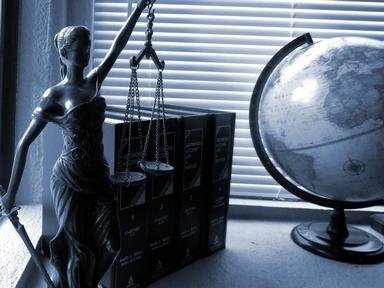Quiz Answer Key and Fun Facts
1. Oh no! Poor Mr.A was murdered by Mr.B. But hang on. Ms.C says she saw B kill A. Mr.D says he heard Mr.A screaming for his life and begging Mr.B not to kill him, and Mrs.E says, Ms.C came and told her that she saw Mr.A being killed by B. Now tell me, whose evidence is considered as relevant evidence in a trial?
2. Apart from deciding relevancy of the evidence, we have to decide which of these people's testimonies is actually admissible in a Court of law. As prosecutor, you will now have to decide which ones will you actually use in your case.
Ms. C: I saw Mr. B killing Mr. A when I was passing by Mr.A's house
Mr. D: I was on my morning walk when I heard Mr.A shouting and begging Mr.B not to kill
Mrs.E: I had just finished breakfast when Ms. C came in all flustered and scared and told me she saw Mr.B killing Mr.A
3. The prosecutor has closed and produced all his witnesses. The case seems bleak for Mr.B, being accused for Mr.A's murder but wait, the defence has a special witness..Mrs.B! Mrs. B says that Mr.B was with her all day, and could not have possibly been at Mr. A's house when the murder happened! Is Mrs. B's evidence relevant?
4. Mrs. B has just testified in the murder trial of her husband Mr.B, that he was with her when he was supposed to have committed the murder of Mr.A, the Public Prosecutor (or District Attorney if you are American), jumps up to cross-examine. He asks Mrs. B whether or not her husband told her that he had murdered Mr.A. Does Mrs. B need to answer this question
5. The prosecutor is just getting into his stride, cross-examining Mrs.B, the wife of the murderer, Mr.B, on her alibi that her husband was with her at the time of the supposed murder. The prosecutor's next question is: "Mrs.B, did your husband go out to buy groceries on that day?"
"Of course,", she replies, "he goes out everyday"
"Then I put it to you that he used that time to kill Mr.A did he not Mrs.B?"
"Weelll..," she starts, "he didn't like him very much, and he may have..."
"Thank you Mrs. B. No further questions your honour", says the Prosecutor with a sumg smile towards the defence counsel, who should now ask permission to do what?
6. Ms. X, a popular actress has just been called a " mean money-grabbing, miserly b***h" by Mr.Y, a press reporter, in his article on movie stars. Like any other person with a reputation to protect, she sues the newspaper for severe damages. Mr. Y and the newspaper take the defence that they are only publishing the truth. So on whom does the burden of proof lie to show that Mr.Y has or has not caused the defamation?
7. In a defamation case, where Ms. X alleges that Mr. Y, a newspaper reporter has defamed her, Mr.Y and the newspaper have taken the defence of truth. This means that they have to actually prove that what they said about Ms. X is a 'mean, money grabbing, miserly b***h' is in fact true. Which of the below can be produced as evidence in the court?
8. A huge bribery scandal has blown up in the Indian Parliament and Home Minister, Mr. K is said to be involved. Apparently, Mr.K took enormous sums to give preference to one company over the other in a huge defence contract. The Court has framed charges and the trial has begun. The first piece of evidence is the file in the Defence Ministry which lists the specifications of the companies' which had bid. Can the prosecutor ask the Court to compel the Government to produce this file in Court?
9. So I, living in Bangalore, India, decide that I don't like G's face. I pick up the nearest iron rod I can lay my hands on, wait for him in a dark corner, make sure there are no witnesses, and I keep hitting him till he is dead. I throw the iron rod into a lake, to remove prints, jog upto the nearest police station and confess to the police officer. Can I be convicted on the basis of the murder weapon and my confession?
10. Lastly, who was the framer of India's Evidence Act of 1872?
Source: Author
almaster
This quiz was reviewed by FunTrivia editor
Bruyere before going online.
Any errors found in FunTrivia content are routinely corrected through our feedback system.
